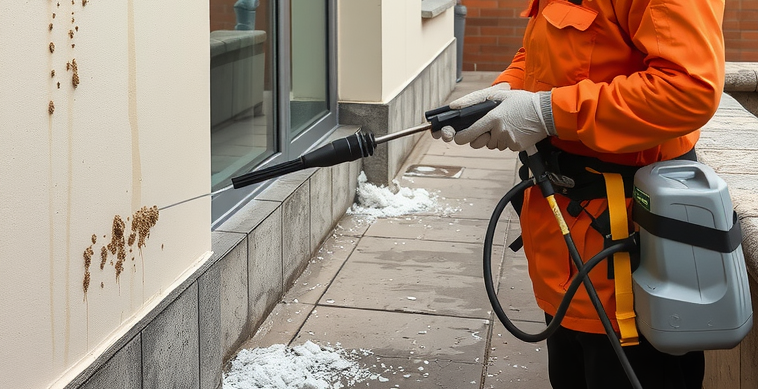Birds are beautiful creatures that add to the charm of our surroundings. However, their droppings can pose serious health risks and damage property if left untreated. From spreading harmful diseases to corroding building materials, bird droppings should be addressed promptly and effectively. In this article, we will explore the health risks associated with bird droppings, the impact on property, and the best cleaning solutions available.
Health Risks of Bird Droppings
Bird droppings are more than just an eyesore; they can be a breeding ground for bacteria, fungi, and parasites that threaten human health. Below are some of the most common health risks associated with exposure to bird droppings:
1. Histoplasmosis
Histoplasmosis is a respiratory disease caused by a fungus called Histoplasma capsulatum, which thrives in bird droppings. When these droppings dry and turn to dust, spores can become airborne and, when inhaled, cause flu-like symptoms or more severe respiratory infections, particularly in individuals with weakened immune systems.
2. Cryptococcosis
This fungal infection, caused by Cryptococcus neoformans, is commonly found in pigeon droppings. When inhaled, it can lead to respiratory infections and, in severe cases, affect the central nervous system, particularly in individuals with compromised immunity.
3. Psittacosis (Parrot Fever)
Psittacosis, a disease that leads to flu-like symptoms, pneumonia, and, in rare cases, severe complications like liver and heart issues, is caused by the bacterium Chlamydia psittaci found in bird droppings, especially from parrots, pigeons, and doves.
4. Salmonella
Bird feces can contain Salmonella bacteria, which can contaminate surfaces and food sources, leading to food poisoning. To learn more about how to prevent Salmonella infections, consider regular pest control services.
5. Ectoparasites
Bird droppings often harbor mites, ticks, and fleas, which can spread to humans and pets, leading to skin irritation and potential disease transmission. Regular pest inspections can help identify and mitigate these risks.
Property Damage Caused by Bird Droppings
Bird droppings are highly acidic, with a pH level between 3 and 4.5, which can cause significant damage to buildings, vehicles, and other structures over time. Here’s how bird droppings impact property:
1. Structural Damage
The acidity in bird droppings can corrode building materials such as metal, stone, and wood. Protect your property from structural damage by implementing effective pest deterrents.
2. Vehicle Damage
Bird droppings can quickly erode car paint and clear coats, leading to discoloration and rust. Regular cleaning and protective measures can help maintain your vehicle’s appearance.
3. Slip-and-Fall Hazards
Accumulations of bird droppings on sidewalks, stairs, and entrances create a slippery surface, increasing the risk of slip-and-fall accidents, which can lead to serious injuries. Maintaining cleanliness in these areas is essential.
4. Clogged Drainage Systems
Bird nests and droppings can clog gutters and drainage systems, leading to water damage and costly repairs. Regular maintenance can prevent these issues.
Effective Cleaning Solutions for Bird Droppings
Since bird droppings pose serious health risks and structural damage, proper cleaning and preventive measures are essential. Below are some of the best practices for safe and effective bird dropping removal:
1. Use Protective Gear
Before cleaning bird droppings, wear protective gear, including gloves, goggles, and a face mask, to avoid inhaling harmful spores and bacteria.
2. Pre-Wet the Area
Never dry sweep bird droppings, as this can release harmful spores into the air. Instead, spray the affected area with water mixed with a mild detergent or disinfectant to keep dust from becoming airborne.
3. Use a Disinfectant
Apply an enzyme-based cleaner or a commercial disinfectant specifically designed for bird droppings. Allow it to sit for a few minutes to break down organic matter before scrubbing.
4. Scrub and Rinse Thoroughly
Use a stiff brush or pressure washer to scrub away bird droppings. Ensure you rinse the area thoroughly with water to remove all residue.
5. Proper Disposal
Dispose of contaminated materials in sealed bags and wash your hands thoroughly after cleaning. If dealing with a large infestation, consider hiring professional cleaning services.
Preventing Future Bird Droppings
Prevention is key to reducing the impact of bird droppings on your property. Here are some effective ways to deter birds from nesting and roosting in unwanted areas:
1. Install Bird Spikes
Bird spikes prevent birds from landing on ledges, signs, and rooftops. They are a humane solution to deter birds without harming them.
2. Use Bird Netting
Installing bird netting can keep birds away from balconies, gardens, and industrial buildings, preventing them from nesting in these areas.
3. Apply Bird Repellents
Non-toxic bird repellent gels and sprays create an unpleasant surface for birds, discouraging them from landing and nesting.
4. Ultrasonic Bird Deterrents
Ultrasonic bird deterrent devices emit high-frequency sounds that are irritating to birds but inaudible to humans, helping keep them away from certain areas.
5. Keep the Area Clean
Removing food sources, securing trash bins, and maintaining cleanliness can discourage birds from roosting in your area.
When to Call a Professional
While minor bird droppings can be handled with DIY cleaning, significant accumulations or infestations require professional intervention. If you notice persistent bird activity or extensive droppings, it’s best to contact a pest control expert to implement long-term prevention strategies.
Take Action Today!
Bird droppings pose serious health risks and property damage, but with proper cleaning and preventive measures, you can keep your surroundings safe and bird-free. If you’re dealing with bird-related issues, consider reaching out to a professional pest control service for expert assistance. For more cleaning and pest management tips, visit our blog and stay informed about the best practices to protect your home and business.
By understanding the dangers of bird droppings and implementing effective cleaning solutions, you can maintain a safer and healthier environment. Don’t wait until the problem escalates—take action today!


